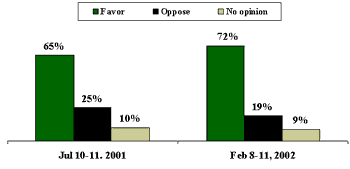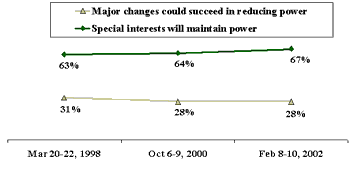GALLUP NEWS SERVICE
PRINCETON, NJ -- In the wake of the Enron controversy, momentum is building to pass new campaign finance laws. The U.S. House of Representatives is currently debating new legislation on campaign finance, and a vote on the bill is expected today. The Senate has already passed its version of a campaign finance bill. The latest CNN/USA Today/Gallup poll shows that most Americans support Congress' efforts at passing new laws in this area, including limits on how much individuals or groups can contribute to the national political parties. Even so, Americans are dubious as to the ultimate success of campaign finance in reducing the power of special interests in Washington.
Support for New Campaign Finance Laws up Slightly From Last Year
A recent Gallup poll showed that just 31% of Americans were satisfied and 50% were dissatisfied with the nation's campaign finance laws. It is not surprising, then, that the vast majority of the public favors new laws -- 72%, according to the latest CNN/USA Today/Gallup poll, conducted Feb. 8-10. This support is slightly higher than that found in July 2001, at which time 65% favored and 25% opposed new campaign finance laws.
| Favor or Oppose Congress Passing New Campaign Finance Laws? |
 |
Democrats (77%) are slightly more likely to favor new laws than are Republicans (70%) and independents (70%), but all three groups show solid support. There is a significant relationship between knowledge of the Enron controversy and support for new campaign finance legislation. Eighty percent of those who say they are closely following the Enron controversy believe that new laws are necessary, compared to just 55% of those who are not following the story closely.
While the question in the current poll does not address specific proposals for campaign finance reform, a CNN/USA Today/Gallup poll conducted Jan. 25-27 shows vast support for imposing limits on "soft money." Soft money contributions are donations to one of the national political parties, and currently there are no limits on amount. (The size of donations made by an individual or group to a candidate's campaign, also known as "hard money," is limited to $1,000 per election.)
The poll showed that 69% favored limits on the amount an individual or group can contribute to the political parties, including 47% who favored it strongly. Only 27% of Americans oppose this type of law. A majority of Americans in all key subgroups support limits on soft money.
| Favor or Oppose Limiting the Amount of Money That any Individual or Group can Contribute to the National Political Parties? |
 |
| Jan 25-27, 2002 |
Americans Remain Skeptical About Efficacy of Campaign Finance Laws
Despite strong support for passing new campaign finance laws, most Americans do not believe such laws would successfully reduce the power of special interests in Washington. Two-thirds of Americans believe that, regardless of new laws, "special interests will always find a way to maintain their power in Washington." Just 28% say "major changes to the laws governing campaign finance could succeed in reducing the power of special interests." The number, 67%, saying that special interests will maintain their power is slightly higher than that found in 2000 and in 1998.
| Could Changing Campaign Finance Laws Succeed in Reducing Special Interest Power? |
 |
Along these same lines, previous polling has shown that Americans expect the effects of campaign finance reform to be modest. A March 2001 poll showed that just 22% thought our democratic form of government would work "much better than it does now" if new campaign finance laws are passed. Thirty-seven percent said government would work "a little better" and 32% said it would work "about the same." This may be why, despite its high level of support, campaign finance reform typically ranks near the bottom of Americans' issue priorities.
Survey Methods
These results are based on telephone interviews with a randomly selected national sample of 1,001 adults, 18 years and older, conducted February 8-10, 2002. For results based on this sample, one can say with 95 percent confidence that the maximum error attributable to sampling and other random effects is plus or minus 3 percentage points. In addition to sampling error, question wording and practical difficulties in conducting surveys can introduce error or bias into the findings of public opinion polls.
Based on what you have heard or read, do you favor or oppose Congress passing new campaign finance laws?
BASED ON -- 514 -- NATIONAL ADULTS; ±5 PCT. PTS.
|
|
Favor |
Oppose |
No opinion |
|
2002 Feb 8-10 |
72% |
19 |
9 |
|
2001 Jul 10-11 |
65% |
25 |
10 |
Some people say major changes to the laws governing campaign finance could succeed in reducing the power of special interests in Washington. Other people say no matter what new laws are passed, special interests will always find a way to maintain their power in Washington. Which comes closer to your point of view?
BASED ON -- 487 -- NATIONAL ADULTS; ±5 PCT. PTS.
|
Major changes could succeed in reducing power |
Special interests will maintain power |
|
|
|
|
2002 Feb 8-10 |
28% |
67 |
1 |
4 |
|
2000 Oct 6-9 |
28% |
64 |
2 |
6 |
|
1998 Mar 20-22 |
31% |
63 |
2 |
4 |
(vol.) -- Volunteered response
